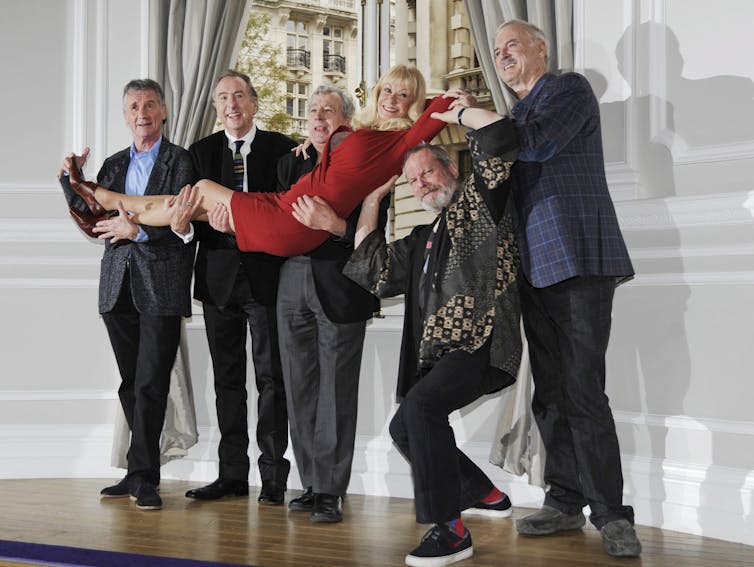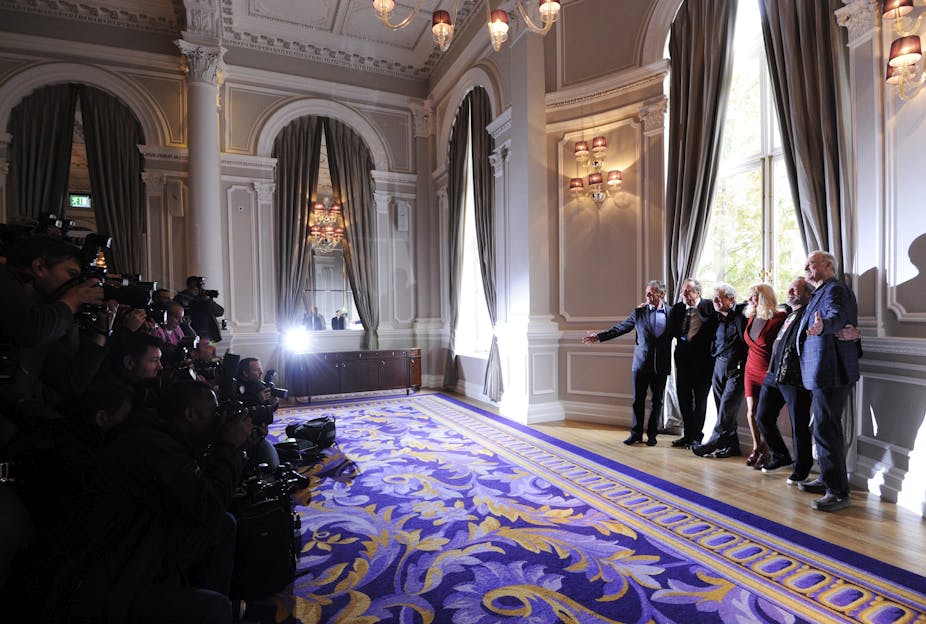The Monty Python crew have put many caveats on their upcoming reunion shows, which starts in London today and will be simulcast live around the world. Perhaps this quote from John Cleese rings truest of them so far:
The main danger we have is that the audience know the scripts better than we do.
Monty Python was always an act that worked with known material, building the sketches from established memories and stereotypes. It took popular caricatures and distorted them. Then it repeated those distortions in cross-references between sketches and in the stage show reprisals (by themselves and by third parties).
Ultimately, private viewers have performed the greatest share of all this repetition by watching endless video replays of the films and TV shows that Monty Python made, and by recycling them in endless conversations about, and recitations of, people’s favourite sketches.
Some of the strongest examples of the caricaturing performance style are in Python spin-offs, the shows that various members made without the group as a whole: the Cluedo-like characters of Cleese’s Fawlty Towers, the fairy-tale heroes and villains in Terry Gilliam’s films, the twee ethnic vignettes of Michael Palin’s travel shows, and so on.
Monty Python even parodied their own caricaturing mindset, in moments like the “What have the Romans done for us?” sketch in Life of Brian.
This is not to say the “Pythonesque” sense of humour lacks creativity: it takes a certain creative genius to mangle the received understandings of our world so plausibly that people can still recognise and laugh at them. But it does underscore the essentially conservative worldview these predominantly Oxbridge lads brought to their material.
It also underscores the essentially conservative impulse of people who laugh at it – myself included.
That’s not to say Monty Python is a front for the Conservative Party. If anything, it should be the other way around: political institutions are ever the suppliers of such fine material for their satirists.
“Conservative” means many things, of course, and for Monty Python it meant at least three. First is the conservatism that does not seek to change the world. This is something the Python crew have said about themselves repeatedly over the years.
The most politically pointed sketch they produced – its script has served as a reading in many political science courses around the world – is from Monty Python and the Holy Grail, when King Arthur (Graham Chapman) stumbles into an anarchist peasant commune.
The peasants refuse to recognise his authority as monarch, they lampoon his qualifications for office as much as his claims to power, and then Arthur leaves suitably deflated.
WOMAN: Well, ’ow did you become king then?
ARTHUR: The Lady of the Lake [angels sing], her arm clad in the purest shimmering samite, held aloft Excalibur from the bosom of the water, signifying by Divine Providence that I, Arthur, was to carry Excalibur. [singing stops]
That is why I am your king!
DENNIS: Listen – strange women lying in ponds distributing swords is no basis for a system of government. Supreme executive power derives from a mandate from the masses, not from some farcical aquatic ceremony.
Two clear points about the constitution emerge from this sketch. One is that the power of the crown descends very unequally onto its subjects. Nothing new in that observation. The other point is that, no matter what those uppity agrarian labourers might say and feel, Arthur remains the king.
Meanwhile, Monty Python’s humour is also conservative in the way it reaches out most directly to white, economically privileged, grammar-schooled and university-graduated, English-speaking, male sorts of people. Generally speaking, the more of those boxes you tick, the more likely you are to find Monty Python funny.
Plenty of people still tick plenty of those boxes in 2014, so it is unsurprising that Python still has an audience. Tickets to see their first show at the imposing O2 arena tonight reputedly sold out 43.5 seconds after release.

Whatever your theoretical position on humour, we have to acknowledge that a joke works for the people it works for. Python’s fans, rather naturally, have tended to share demographic properties with the performers; thus they have tended to occupy those same walks of life that the sketches caricature.
Third, Monty Python’s humour is conservative in the way it lasts and lasts — if you will pardon a lame old Australian gag. It is a great kind of humour for lovers of recycling because its core strength is repetition, reuse, recursion.
When fans watch the Norwegian blue parrot sketch, say, they typically laugh at least as strongly for repeat screenings as they did in their original viewings. When audiences see that same joke repeated live on stage in a “reunion performance,” they typically laugh even more strongly.
Those audience members are primarily laughing for their own memories of laughing. Each repeat performance triggers an accumulated memory of all the times we have got that funny feeling while witnessing the joke before. Arguably, it is even funnier than the original, because we can feel it more intensely than the original.
This conservative recycling, or recursion, is now the most commercially valuable element of Monty Python’s material. Many of us want to remember the original whimsy that defeated death by consecrating a longing for fjordland, say.
We accomplish that, thanks to Monty Python’s reunited facilitation, by feeling it even more intensely than we did before. We pine for our pining for those pine-wooded yesterfjords.
Many more punters are willing to pay for that pine-joy than the O2 could possibly accommodate.

